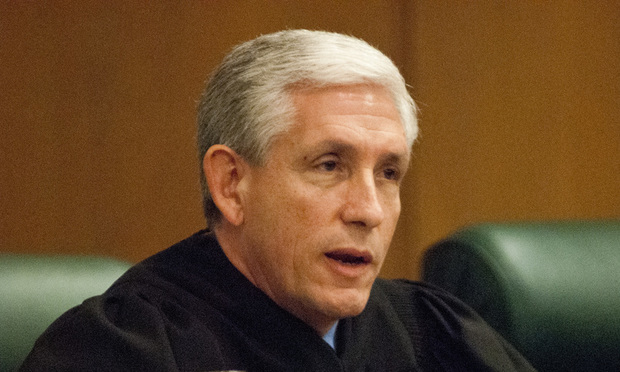Defense Attorneys Argue State Violated Rape Shield Law
“You may have done it for nice reasons toward a noble goal, but you made a child talk about her prior sexual history—and not just a general sexual history but a criminal sexual history,” Presiding Justice David Nahmias told prosecutor.
October 16, 2018 at 05:08 PM
4 minute read
 Presiding Justice David Nahmias, Supreme Court of Georgia (Photo: John Disney/ALM)
Presiding Justice David Nahmias, Supreme Court of Georgia (Photo: John Disney/ALM)
Defense attorneys for a man convicted of raping and molesting children are in the unusual position of using Georgia's rape shield law—which protects the privacy of victims—to demand a reversal.
And they may have a chance to win, based on questions from the Georgia Supreme Court during oral arguments last week.
“Does the rape shield statute apply to the state?” Andrew Fleischman of Ross and Pines asked the justices. “I believe it does.”
Fleischman and partner Noah Pines represented Charles White on appeal. A Newton County Superior Court jury convicted White in November 2014 of three counts of rape, one count of statutory rape, 10 counts of child molestation, three counts of aggravated sodomy, three counts of incest and one count of enticing a child for indecent purposes.
The appeal hinges on the testimony of one of the alleged victims, who was prosecuted herself for repeating the same kind of abuse against other children.
“The state used the sexual history of a twelve-year-old girl to establish that she had been molested. It informed the jury that she had molested two other children,” Fleischman and Pines said in their brief. “The Rape Shield statute should spare victims from shame, humiliation and embarrassment.”
White's attorneys argued that the trial court was wrong to allow the prosecutor to question the girl about her abuse of other children and that the Georgia Court of Appeals erred by upholding the conviction.
They said the case “discourages victims from coming forward by leaving them uncertain of whether their sexual histories will remain private. Because of that uncertainty, half a shield is worse than none at all. We request a new trial.”
Fleischman asked the justices for a reversal as a lesson that would be taught at every Prosecuting Attorneys' Council of Georgia conference “for years to come.”
Said Fleischman, “The state learns when it loses.”
Alcovy Judicial Circuit District Attorney Layla Zon prosecuted White's case herself and handled the appeal. She accused White of manufacturing an issue in an attempt to hijack the rape shield law for his own purposes.
In her brief, Zon said White's “fake outrage concerning the victim's 'shame, humiliation, and embarrassment' from the state's introduction of this evidence is simply a thinly veiled argument against the admissibility of relevant evidence” that was damning to him at trial.
Fake or not, White's issue put Zon on the hot seat at oral arguments.
“You may have done it for nice reasons toward a noble goal, but you made a child talk about her prior sexual history—and not just a general sexual history but a criminal sexual history,” Presiding Justice David Nahmias said.
“With all due respect, Justice, I disagree with your characterization,” Zon answered, adding her examination of the witness wasn't malicious.
“I'm not suggesting it was malicious,” Nahmias said. But he added, “The purpose (of the rape shield law) was to have people who have suffered sexual abuse—allegedly—not to have to go to court and have their prior sexual behavior paraded in front of their neighbors.”
Other justices also questioned Zon more rhetorically about the absence from the law of the exception she claimed for the state in bringing up prior sexual behavior of a victim. “Can you make exceptions whenever you want?” Justice Charlie Bethel asked.
“Is this something the General Assembly could fix?” Justice Sarah Warren asked.
Nahmias called Zon's argument “spin.”
Zon moved on, saying she could tell her argument “is not very persuasive.”
“Lucky for me, the defense fails the plain error test,” Zon continued. “The legal error must be clear and obvious rather than subject to dispute.”
And Zon argued that White would have been convicted anyway—even without the testimony about one of his victims going on to abuse others—because of the two other victims.
Having saved some time for rebuttal, Fleischman was able to ask the justices again for a reversal—selling it as a protection for victims.
“People need to know what their laws say,” Fleischman said. “Victims should have a say, and we all should.”
The case is White v. State, No. S18G0365.
This content has been archived. It is available through our partners, LexisNexis® and Bloomberg Law.
To view this content, please continue to their sites.
Not a Lexis Subscriber?
Subscribe Now
Not a Bloomberg Law Subscriber?
Subscribe Now
NOT FOR REPRINT
© 2025 ALM Global, LLC, All Rights Reserved. Request academic re-use from www.copyright.com. All other uses, submit a request to [email protected]. For more information visit Asset & Logo Licensing.
You Might Like
View All
A Plan Is Brewing to Limit Big-Dollar Suits in Georgia—and Lawyers Have Mixed Feelings
10 minute read
On The Move: Kilpatrick Adds West Coast IP Pro, Partners In Six Cities Join Nelson Mullins, Freeman Mathis
6 minute read

Did Ahmaud Arbery's Killers Get Help From Glynn County DA? Jury Hears Clashing Accounts
Trending Stories
Who Got The Work
J. Brugh Lower of Gibbons has entered an appearance for industrial equipment supplier Devco Corporation in a pending trademark infringement lawsuit. The suit, accusing the defendant of selling knock-off Graco products, was filed Dec. 18 in New Jersey District Court by Rivkin Radler on behalf of Graco Inc. and Graco Minnesota. The case, assigned to U.S. District Judge Zahid N. Quraishi, is 3:24-cv-11294, Graco Inc. et al v. Devco Corporation.
Who Got The Work
Rebecca Maller-Stein and Kent A. Yalowitz of Arnold & Porter Kaye Scholer have entered their appearances for Hanaco Venture Capital and its executives, Lior Prosor and David Frankel, in a pending securities lawsuit. The action, filed on Dec. 24 in New York Southern District Court by Zell, Aron & Co. on behalf of Goldeneye Advisors, accuses the defendants of negligently and fraudulently managing the plaintiff's $1 million investment. The case, assigned to U.S. District Judge Vernon S. Broderick, is 1:24-cv-09918, Goldeneye Advisors, LLC v. Hanaco Venture Capital, Ltd. et al.
Who Got The Work
Attorneys from A&O Shearman has stepped in as defense counsel for Toronto-Dominion Bank and other defendants in a pending securities class action. The suit, filed Dec. 11 in New York Southern District Court by Bleichmar Fonti & Auld, accuses the defendants of concealing the bank's 'pervasive' deficiencies in regards to its compliance with the Bank Secrecy Act and the quality of its anti-money laundering controls. The case, assigned to U.S. District Judge Arun Subramanian, is 1:24-cv-09445, Gonzalez v. The Toronto-Dominion Bank et al.
Who Got The Work
Crown Castle International, a Pennsylvania company providing shared communications infrastructure, has turned to Luke D. Wolf of Gordon Rees Scully Mansukhani to fend off a pending breach-of-contract lawsuit. The court action, filed Nov. 25 in Michigan Eastern District Court by Hooper Hathaway PC on behalf of The Town Residences LLC, accuses Crown Castle of failing to transfer approximately $30,000 in utility payments from T-Mobile in breach of a roof-top lease and assignment agreement. The case, assigned to U.S. District Judge Susan K. Declercq, is 2:24-cv-13131, The Town Residences LLC v. T-Mobile US, Inc. et al.
Who Got The Work
Wilfred P. Coronato and Daniel M. Schwartz of McCarter & English have stepped in as defense counsel to Electrolux Home Products Inc. in a pending product liability lawsuit. The court action, filed Nov. 26 in New York Eastern District Court by Poulos Lopiccolo PC and Nagel Rice LLP on behalf of David Stern, alleges that the defendant's refrigerators’ drawers and shelving repeatedly break and fall apart within months after purchase. The case, assigned to U.S. District Judge Joan M. Azrack, is 2:24-cv-08204, Stern v. Electrolux Home Products, Inc.
Featured Firms
Law Offices of Gary Martin Hays & Associates, P.C.
(470) 294-1674
Law Offices of Mark E. Salomone
(857) 444-6468
Smith & Hassler
(713) 739-1250






